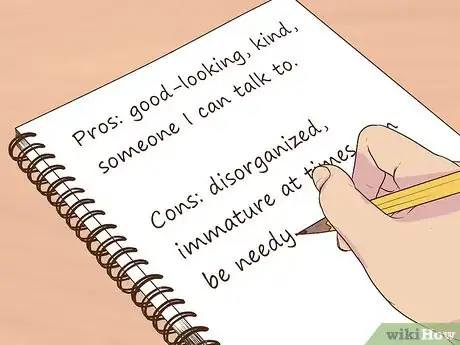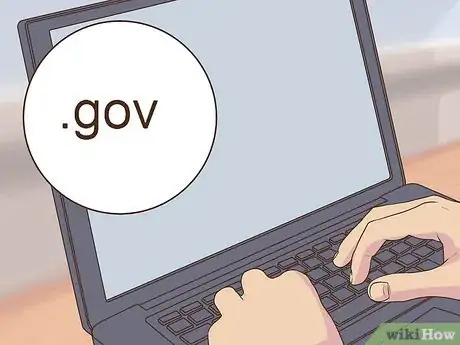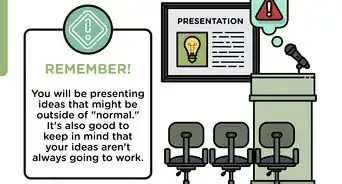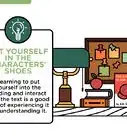This article was co-authored by Rachel Clissold. Rachel Clissold is a Life Coach and Consultant in Sydney, Australia. With over six years of coaching experience and over 17 years of corporate training, Rachel specializes in helping business leaders move through internal roadblocks, gain more freedom and clarity, and optimize their company’s efficiency and productivity. Rachel uses a wide range of techniques including coaching, intuitive guidance, neuro-linguistic programming, and holistic biohacking to help clients overcome fear, break through limitations, and bring their epic visions to life. Rachel is an acclaimed Reiki Master Practitioner, Qualified practitioner in NLP, EFT, Hypnosis & Past Life Regression. She has created events with up to 500 people around Australia, United Kingdom, Bali, and Costa Rica.
There are 13 references cited in this article, which can be found at the bottom of the page.
This article has been viewed 19,572 times.
Emotions can lead you to make decisions you regret later, so learning to focus on the facts of the situation can help. In addition, separating feelings and facts can help keep any discussion from becoming heated and ugly. Of course, you can only control your side of the discussion, but staying calm can help the other person understand that you don't want to delve into feelings. Whether you're having a discussion about politics or you're involved in a personal argument with someone close to you, knowing the difference between feelings and facts will help keep the argument more reasonable.
Steps
Laying Out the Situation
-
1Lay out the problem. When you're making a decision or faced with an issue, you may be wallowing in emotion because you haven't figured out exactly what the problem is. Take a moment to define the problem in clear terms. Once you've done that, you can gather the information you need to move ahead.[1]
- Identifying the specific emotions at play may be of some help, too. Once you identify the emotions, you will be able to address them and understand where they are coming from.
- For instance, you might ask yourself, "Okay, what is the problem here, and why am I becoming emotional about it? The problem is that Jeff failed his math test, and I'm angry because he told me he was doing his homework and didn't need help. I feel angry because he lied to me, and I feel disrespected. I am also worried about how this will impact his grade, because I want him to succeed."
- Try journaling about what's going on. That can be a powerful tool to get clear on what's really going on. It can also help you separate facts from emotions.[2]
-
2Become knowledgeable about the situation. Often, to stay calm and focus on the facts, you need more information about the situation. Sometimes, that means doing your own research to learn more. Other times, you may need to ask other, more knowledgeable people for help, so that you can learn from them. Either way, try not to move forward without having as much information as you can.[3]
- Don't be afraid to ask for more time to research and learn about a topic, or to admit you don't know much about it. You might say, "You know, I don't know much about that topic. I'd like to look into it a bit further before forming my opinion."
- You can set a deadline to revisit the topic with the person. You could say, "Can we talk about this on Monday when I've had time to do more research?"
Advertisement -
3Make a pros and cons list. One way to clear your head about a decision or problem is to list both the pros and cons of the situation. You likely find that when the facts are laid out for you, the way forward is much clearer because you don't have to rely on emotion, just on what's in front of you.[4]
- Don't just look at short-term effects. Think about how the decision or situation will affect you and others in the long-term.
-
4Don't worry yourself out of a decision. When you're faced with making a decision, you may find that you are having trouble deciding. This indecisiveness often stems from the fact that you may think you can avoid making a mistake if you don't decide, which is an emotional response. The truth is, though, not making a decision is, in fact, a decision, but it robs you of your agency and ability to direct your own life. Keep in mind, one right answer often doesn't exist, so pick a path based on the information you have and move ahead.[5]
- This is another situation in which asking for more time might be appropriate. Make sure you set a deadline so you don't fall into the trap of simply never revisiting the topic or making a decision. You might say, "Can I let you know tomorrow morning?" or, "I'm going to sleep on it and I will let you know tomorrow."
Knowing the Facts
-
1Read the necessary material. You can't focus on facts unless you know the facts. That means you need to read up on whatever topic to know the facts about, such as a side of a debate or political issue. You have to be an expert (or at the very least, fairly knowledgeable) to be able to make a factual, logical argument.
- Try reading up on the issues at trusted websites. Government websites (.gov) and educational (.edu) are usually good choices.
- On other sites, check to see if the site looks spammy, such as having too many ads. Also, consider the source. If the information is paid for by a particular organization that advocates one side of an issue, it's more likely to be biased.
- Another way to make sure you have good information is to see if you can verify it with three different, reputable sources.
-
2Look at both sides of an issue. Even if you think you know where you stand, emotion can take over in an argument if you only know one side of the issue. Make sure you study (factual) viewpoints from both sides, so you know where the other side is coming from.
- One reason this advice is important is that when you believe something, you tend to only look at sources that confirm what you know (called confirmation bias). That doesn't help you in a debate because you'll be easily brought down by the other side. And when your facts fail, you're more likely to move over to emotions.
- Try writing out any arguments that might be made by the other side. Familiarize yourself with the facts that might be presented by the other side. Identifying potential facts or arguments they might bring up will allow you to prepare your response. This will keep you from being caught off-guard and ensure you are giving both sides equal weight.
-
3Bring in statistics. One way you can stick to the facts when you're talking or thinking about something is to bring in statistics.[6] Statistics are based on research, and they can help you back up what you're saying or thinking with verifiable facts. Just make sure your statistics come from a legitimate source. Otherwise, they aren't worth looking at.
Remaining Calm
-
1Realize emotions stem from within. While outside forces often trigger emotions, the emotions themselves come from within you. That means you have control over them. Therefore, when emotions start to take over, let yourself feel them for a minute and accept responsibility. Then, try to look at the situation with a clear head.[7]
- For example, maybe someone says something that you find mean, and you start to get angry. Take a moment to feel it. That's your response, but it doesn't have to be. Now think about the situation. Was the comment justified? Can you learn from it? You may find that your emotional response isn't appropriate to the situation when you focus on what was actually said.
- Trying to identify where the emotion came from can also help you remain calm. For instance, maybe a comment makes you disproportionately angry. Before reacting, you might ask yourself, "Why is this making me so angry?" You might realize that the comment makes you feel like you're being ignored or dismissed. Think about if there are other situations in your life in which you feel ignored or dismissed, and if your anger really has little to do with what the person actually said. Maybe they're not ignoring you, but simply misunderstood what you said.
-
2Take a break. Sometimes, the best way to move the focus from your feelings to the facts is to take a break. You may need a few minutes — or even a day or more — to process what's going on, and that's okay. Take a walk and try to look at the situation with an open mind. Alternatively, try a few minutes of deep breathing to clear your head. Both can help clear out the emotion, making way for you to see the facts.[8]
- To deep-breathe, try closing your eyes. Breathe in while counting to four in your head. Hold it for four counts, then breathe out for four counts. Try to breathe deeply, from your diaphragm. You can also take longer breaths if it helps. Keep using this technique until you feel yourself calm down.
- The length of your break may be dictated by the severity of your emotional reaction. If you are having a particularly strong reaction, you may need to sleep on it before you can approach the person from a calm, emotion-free place.
-
3Stay calm before responding. If you feel yourself getting heated in an argument, you'll likely turn to feelings instead of facts. When you start getting hot under the collar, try taking a deep breath to calm yourself down before responding. In fact, counting to ten in your head can give you the moment you need.[9]
- If you feel yourself getting really heated, ask to take a break, if possible.
-
4Don't let defensiveness take over. Defensiveness is a natural emotion when you're in an emotional discussion with someone you care about. However, giving into defensiveness is not sticking to the facts, and it is not productive. When you get defensive, you're not able to see the other person's side, and often, you start throwing emotional attacks into the argument.[10]
- Take what the other person says to heart. If they say something is a problem, take a minute to consider if they're right instead of instantly getting defensive.
- Think about the purpose of the discussion. Are you trying to find a compromise with the other person or find a solution to a problem? Let this be your focus instead of defending yourself.
Working with Other People
-
1Agree on a few common goals. One way to avoid getting too emotional in situation argument is to try to find common goals. Making goals together with another person will help you focus on what you both want, which in turn can help the conversation be more focused on finding a solution, rather than on a heated emotional argument.[11]
- The goal can be something like "find a solution for our problem," or "make sure the discussion stays respectful."
-
2Be empathetic. While empathy stems from emotion, it comes from being able to see things from another person's perspective, which can help remove you from your own strong feelings and make a fact-based decision. In other words, most decisions affect other people in some way. When they do, it's important to consider how that decision will affect them. Will it make their lives better or worse? To make a good decision, look at the facts of how it will affect people, and try to lean towards the good.[12]
- One way to help take emotion out of the equation is to place yourself last. When you're not in the equation, your emotion is less likely to affect your decision.
- Or try closing your eyes and remember a time when someone treated you with kindness and empathy when they didn't have to, and think about how that felt.
-
3Skip personal attacks. If you're just sticking to facts, using an attack on the other person isn't helpful. A personal attack isn't about facts. It's resorting to an emotional response based on how you feel about the other person's beliefs and character. This is called an ad hominem argument. If you find yourself wanting to attack the person's character, bite your tongue and move back to your statistics.[13]
- Avoid bringing in things from the past or other irrelevant points that serve only to hurt the other person and do not move the conversation forward.
- Focus on the behavior or specific issue, not the person. Yes, you sometimes need to talk about behaviors the other person is doing that hurt you in a conversation. However, you shouldn't focus that discussion on the person's personality. Rather, you should focus on the behavior itself. Attacking a person's personality will feel like a personal attack.[14]
- For instance, instead of saying, "You never help around the house," you could say, "I would appreciate it if you helped around the house more."
-
4Don't exaggerate. You may not see how this advice relates to feelings, but exaggeration tends to be an emotional response. You're twisting the facts to fit your argument, which is based on emotion. If you stretch the facts too far, you could be called out on it.[15]
-
5Acknowledge your mistakes. In a fact-based discussion, you must be willing to own up to it when you make a mistake. If you're not willing to do that, you're not engaging in a fact-based discussion. You're having a feeling-based monologue. Therefore, if someone proves you wrong, concede the point. That doesn't mean everything you've said is wrong, just that particular point.
- Admitting that you made a mistake, or that you're not a perfect person, doesn't automatically mean you are wrong or invalidate your point of view.
- Take ownership of your mistakes without blaming others. Instead, talk to anyone who was affected by the issue and have a heart-to-heart conversation about what happened and how it made you feel. When you can connect with people at that level, you'll be more likely to be able to work together.[16]
-
6Believe that the argument will be resolved in a personal discussion. This advice involves a bit of willpower on your part. If you have the hope that the argument can be resolved, it frees your thinking a bit to focus on the facts and solutions rather than your emotional involvement. This type of thinking is especially important when you're in an argument with someone you have a close relationship with; resolving the argument is integral to keeping the relationship going.[17]
-
7Be willing to end a heated argument or debate. While you should believe you can resolve an argument with someone you're close to, sometimes the better part of valor is walking away from an argument about politics or religion, even if you do know the person well. If the argument is getting heated and it's obvious the other person isn't willing to stick to the facts, you may need to just concede the point and move on. You can't control the other person's feelings, only your own.[18]
Expert Q&A
-
QuestionHow do you focus emotionally?
 Rachel ClissoldRachel Clissold is a Life Coach and Consultant in Sydney, Australia. With over six years of coaching experience and over 17 years of corporate training, Rachel specializes in helping business leaders move through internal roadblocks, gain more freedom and clarity, and optimize their company’s efficiency and productivity. Rachel uses a wide range of techniques including coaching, intuitive guidance, neuro-linguistic programming, and holistic biohacking to help clients overcome fear, break through limitations, and bring their epic visions to life. Rachel is an acclaimed Reiki Master Practitioner, Qualified practitioner in NLP, EFT, Hypnosis & Past Life Regression. She has created events with up to 500 people around Australia, United Kingdom, Bali, and Costa Rica.
Rachel ClissoldRachel Clissold is a Life Coach and Consultant in Sydney, Australia. With over six years of coaching experience and over 17 years of corporate training, Rachel specializes in helping business leaders move through internal roadblocks, gain more freedom and clarity, and optimize their company’s efficiency and productivity. Rachel uses a wide range of techniques including coaching, intuitive guidance, neuro-linguistic programming, and holistic biohacking to help clients overcome fear, break through limitations, and bring their epic visions to life. Rachel is an acclaimed Reiki Master Practitioner, Qualified practitioner in NLP, EFT, Hypnosis & Past Life Regression. She has created events with up to 500 people around Australia, United Kingdom, Bali, and Costa Rica.
Certified Life Coach Journaling is a really great way to separate emotion from fact, which can help you see the truth of what's actually happening more clearly.
Journaling is a really great way to separate emotion from fact, which can help you see the truth of what's actually happening more clearly.
References
- ↑ https://psychcentral.com/lib/how-to-make-wiser-decisions#1
- ↑ Rachel Clissold. Certified Life Coach. Expert Interview. 26 August 2020.
- ↑ https://www.apa.org/topics/anger/strategies-controlling
- ↑ https://psychcentral.com/lib/how-to-make-wiser-decisions#1
- ↑ https://psychcentral.com/lib/how-to-make-wiser-decisions#1
- ↑ https://www.cs.utah.edu/~riloff/pdfs/naacl-arg-wkshp15.pdf
- ↑ https://hbr.org/2016/12/4-ways-to-control-your-emotions-in-tense-moments
- ↑ https://psychcentral.com/lib/what-is-emotional-intelligence-eq/
- ↑ https://www.psychologytoday.com/blog/fulfillment-any-age/201408/6-ways-win-any-argument
- ↑ https://www.psychologytoday.com/blog/between-you-and-me/201506/4-things-you-cant-do-when-you-argue-your-partner
- ↑ https://www.psychologytoday.com/blog/fulfillment-any-age/201406/5-tips-tough-conversations-your-partner
- ↑ https://www.psychologytoday.com/us/blog/what-would-aristotle-do/201505/how-be-empathetic
- ↑ https://psychcentral.com/blog/leveraging-adversity/2015/01/how-to-not-take-personal-attacks-personally-what-to-do-instead#1
- ↑ https://www.psychologytoday.com/blog/between-you-and-me/201506/4-things-you-cant-do-when-you-argue-your-partner
- ↑ https://www.psychologytoday.com/us/blog/science-and-sensibility/201211/anxiety-and-exaggerations
- ↑ Rachel Clissold. Certified Life Coach. Expert Interview. 26 August 2020.
- ↑ https://www.psychologytoday.com/blog/fulfillment-any-age/201408/6-ways-win-any-argument
- ↑ https://www.psychologytoday.com/us/blog/compassion-matters/201404/5-steps-end-any-fight













































































